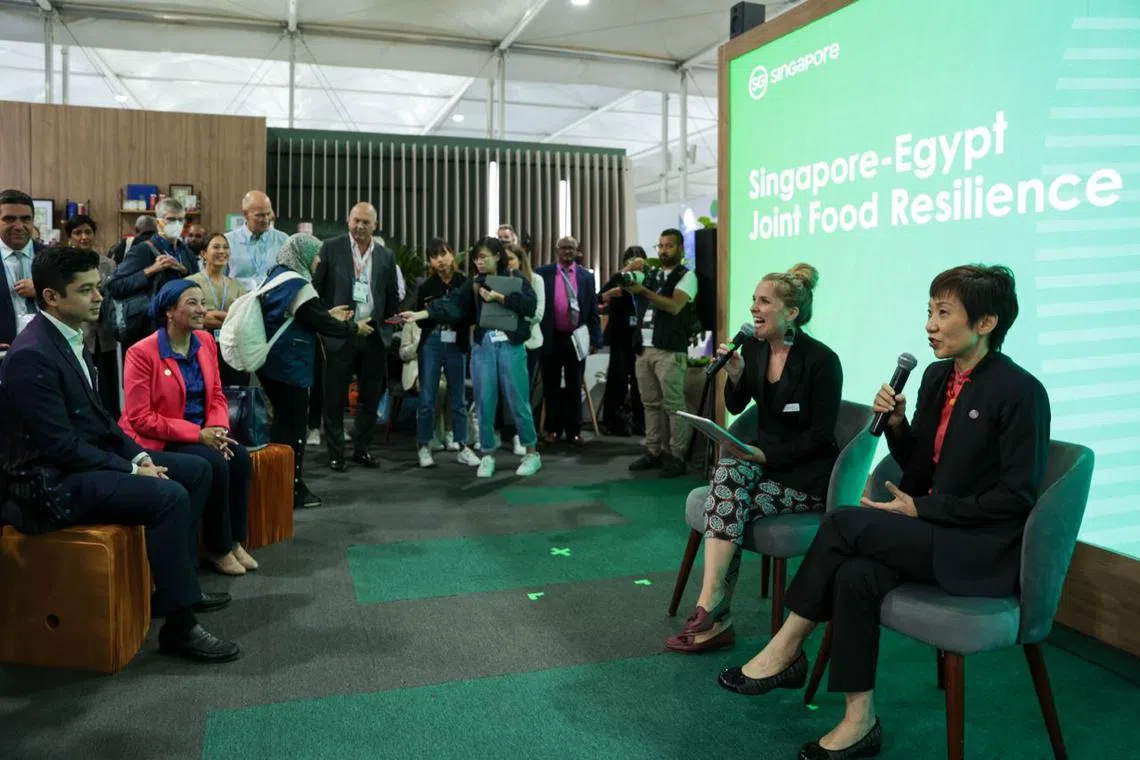Climate change impacts add urgency to boosting food security, innovation: Grace Fu
Sign up now: Get ST's newsletters delivered to your inbox

Minister for Sustainability and the Environment Grace Fu and Egypt’s Minister of Environment Yasmine Fouad at a panel discussion on how both countries are overcoming challenges to food resilience.
ST PHOTO: SAMUEL RUBY
Follow topic:
SHARM EL-SHEIKH, EGYPT - Climate change will exacerbate food security concerns in the years ahead, highlighting the need for countries to pivot towards resilient and sustainable food production, Minister for Sustainability and the Environment Grace Fu said.
Recent scientific reports have said more than 30 per cent of global crop and livestock areas could become climatically unsuitable by 2100
The event, which was also attended by Egypt’s Minister of Environment Yasmine Fouad, discussed how both countries are overcoming challenges with regard to food resilience as climate impacts worsen.
Ms Fu said: “For example, by the end of the century, rice yields of some countries in South-east Asia may potentially decline by about 50 per cent, assuming no adaptation or technical improvement.
“This would have a knock-on impact on food security in the region and around the world.”
The theme on Saturday at the United Nations climate conference, which is being held at the Red Sea resort town of Sharm El-Sheikh, was on adaptation and agriculture. Globally, climate change is threatening food production and the livelihoods of millions of farmers.
But agriculture is also a major source of greenhouse gas emissions
Ms Fu will be at the conference from Saturday until Nov 20, and will attend high-level meetings and deliver Singapore’s national statement.
Nearly 200 nations are discussing ways to implement their climate commitments, and to make progress on issues including cutting greenhouse gas emissions, adapting to climate impacts and funding irreparable loss and damage from extreme weather-related events suffered by poorer nations, such as floods, storms and severe drought.
Singapore is developing localised climate models that would provide better resolution on changes in temperature, rainfall and weather patterns, allowing more accurate predictions on regional crop and aquaculture yields, said Ms Fu.
This can help guide regional countries in developing adaptation solutions, and Singapore will be sharing its data through bodies such as the UN Food and Agriculture Organisation (FAO) so that countries can better equip themselves against the effects of climate change.
To boost the nation’s food security, Singapore has been increasingly looking into novel foods, such as cell-cultured meat, and recently approved a type of microbial protein made from single-cell organisms and common gases found in air.
The yellow microbe-based protein, called Solein, was created by Finnish start-up Solar Foods.
Dr Fouad spoke about the new Food and Agriculture for Sustainable Transformation, or Fast, which was launched on Saturday at COP27. The initiative, jointly launched by Egypt’s COP27 presidency and the FAO, will increase climate finance contributions for agriculture and food systems to support the most vulnerable communities.
Ms Fu also spoke about the challenges of food security in the face of the Ukraine war, and the state of climate change awareness in Singapore, among other issues.
Singapore’s pavilion on Saturday featured a series of panel discussions, ranging from how rice production – responsible for about 12 per cent of global emissions – can be decarbonised, to how alternative proteins like plant-based meat could help feed the world sustainably.


